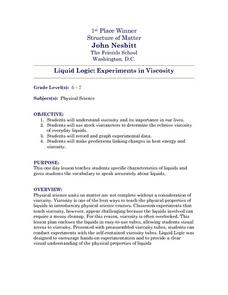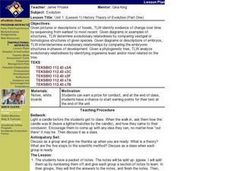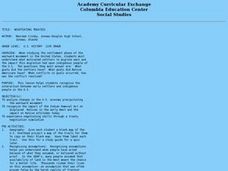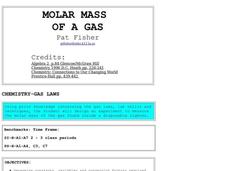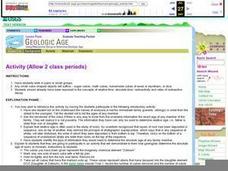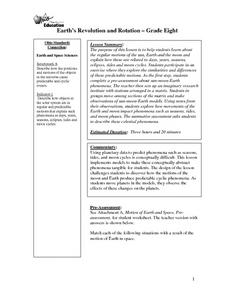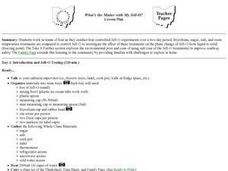Curated OER
Moon Observations
Students study the science of the moon. In this moon observations lesson plan, students study vocabulary associated with the moon, study a lunar calendar, and a phases of the moon's orbit around the Earth.
Curated OER
Recycling
Students examine different "cycles" that are found in nature, such as the water cycle and recycling. They create their own artwork about cycles to be displayed on a bulletin board
Curated OER
Weapons of Mass Destruction
Students share their prior knowledge of WMD, discuss how the U.S. has responded to this threat and what changes, if any, the US should take for the future. They role-play as national secruty advisor while participating in a fictional WMD...
Curated OER
Liquid Logic: Experiments in Viscosity
Middle schoolers examine specific characteristics of liquids through a hands-on lab activity. An experiment with teacher prepared viscosity tubes is conducted in which liquid identities are predicted based on data. A hypothesis is...
Curated OER
History Theory of Evolution
Students identify fossils. They identify evidence of change over time when given pictures of fossils to determine the proper sequencing. In addition, they determine evolutionary relationships by comparing embryonic structures.
Curated OER
Energy Defined
Fourth graders complete activities to study the sources of energy and forms. In this energy lesson, 4th graders discuss the origin of energy and define it. Students participate in several experiments to further study energy including a...
Curated OER
Negotiating Treaties
Eleventh graders recognize the interaction between early settlers and indigenous people in the U.S. They recognize the impact of the Indian Removal Act on displaced Natives in the early West and the impact on Native attitudes today.
Curated OER
The Interactive Periodic Table of the Elements
Students study the different types of metals. In this investigative lesson students watch a demonstration on the effects of temperature on atoms and take a tour through baone matter.
Curated OER
The Great Depression and New Deal
Elementary pupils are introduced to the Great Depression as a critical period of hardship in United States history. They engage in collaborative assignments researching the Dust Bowl, the New Deal, US presidents, and presidential libraries.
Curated OER
Molar Mass
Students apply the ideal gas law and Dalton's Law of Partial Pressure to develop an experiment which determine the molar mass of butane from disposable lighters. In small groups, they develop a procedure and have it approved before...
Curated OER
Enriching Student Inquiry into Endangered Animals
Students read aloud novel Hoot, by Carl Hiassen, choose endangered animal, complete individual research projects related to their interest, prepare persuasive writing piece, and compare and contrast two endangered animals.
Curated OER
Using Radioactive Decay to Determine Geologic Age
Students investigae using radioactive decay to determine geologic age.
Curated OER
Earth's Revolution and Rotation
Eighth graders investigate the regular motions of the sun, Earth and the moon and explain how these are related to days, years, seasons, eclipses, tides and moon cycles. They participate in an exercise where they explore the...
Curated OER
Specific Heat Capacity of a Metal
Eleventh graders investigate the relationship between heat and energy transfer. They review terms including heat, work, calorimetry and the procedures for an experiment. After assembling the materials for the experiment, they observe...
Curated OER
Colored Clouds
Fourth graders, in groups, examine how particles in warm water move faster than particles in cold water.
Curated OER
Transfer of Thermal Energy
Students define temperature and heat, distinguish between temperature and heat flow, calculate amount of heat energy released or absorbed in chemical process, and design procedure, through experimentation, to gather and evaluate data to...
Curated OER
Physical and Chemical Properties of Matter
Students identify the physical and chemical properties of matter. They review the types of matter. Students list the four states of matter (Solid, Liquid, Gas and Plasma). They recognize and describe the different types of matter.
Teach Engineering
Cost Comparisons
Our final proposal for the cost of the bridge requested is ... In the last segment in a series of 10, pairs work together to develop a proposal for a city bridge design. The class completes a cost comparison between concrete and steel to...
Curated OER
Electromagnets
Students are introduced to the relationship between electricity and magnetism. Using a compass, they observe and record the effects of placing the object near magnetic fields and electric currents. They also experiment using a steel and...
Curated OER
The Lives of the People: To Understand the People is to Understand the Times
Students examine the time period of the Great Depression. Using primary source documents, they read excerpts of interviews done by author Studs Terkel for one of his books. They practice interviewing their partner in front of the class...
Curated OER
Physics: Bounce - Projectile Motion and Collisions
Students conduct and observe experiments in Newtonian mechanics, kinematics, and projectile motion. They analyze the motion of a ball rolling off a table, falling, and then bouncing. Students answer a series of questions analyzing the...
Curated OER
Exploring Centers of Triangles
Students explore properties of triangles using angle bisectors, incenters, circles, midpoints, and altitudes. They use Geometer's Sketchpad in order to create triangles and their properties.
Curated OER
"Jazz is About Collaboration": Jim Crow Laws And Segregation
Students explore development of jazz music in the 1930s by forming imaginary jazz bands which tour several cities in Depression-era America. Jazz band members create imaginary identities for themselves, develop publicity for their tour,...
Curated OER
What's the Matter with My Jell-o?
Young scholars work in teams of four as they conduct four controlled Jell-O experiments over a two-day period. The Family Page extends this learning to the community by providing families with challenges to explore at home.





